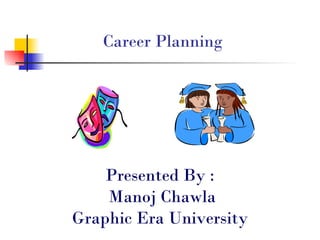Career Orientation Program By Manoj Chawla
- 1. Career Planning Presented By : Manoj Chawla Graphic Era University
- 2. Organization of talk…. What is career planning ? Glimpse of career planning process How important is career planning Career planning by Individuals Guidelines
- 3. What is career?? Job vs. Career Job – “What can I do now to make money?” Career – Chosen Profession for your life.
- 4. Career planning what’s that?? “ Career planning consists of activities and actions that you take to achieve your individual career goals”
- 5. Deeper insight … It is a life-long process, key learnings purpose personality interests skills talents Develop a self- concept, learn about careers, and work situations Make a career choice, while developing and coping social skills
- 6. Career planning : An ongoing process Explore your interests and abilities Strategically plan your career goals Create your future work success by designing learning and action plans to help you achieve your goals.
- 7. How important is career planning? People leave an organisation due to lack of career growth Degree of clarity Helps in identifying handicaps & the blind spots to overcome Significant motivator Key retention tool Critical human resource strategy
- 8. Whose responsible for planning ones career?? Individual
- 9. Self Assessment Academic/ Career options Relevant /Practical Experience Job Search Individual career planning process
- 10. 1. Self- Assessment Aware of the interrelationship between self and occupational choice Start by: Learning interests, abilities, skills, and work values Listing accomplishments Understanding physical and psychological needs Assessing aspirations and motivation level Deciphering personal traits and characteristics
- 11. Competency Areas Gain self-awareness Improve self-confidence Understand time and stress management Develop personal/professional management skills Strategies For Gaining Competencies Take exploratory classes Identify personality style Identify work values Demonstrate skills in overcoming self-defeating behaviors Identify symptoms of stress 1. Self- Assessment
- 12. 2. Academic / Career options Investigate the world of work in greater depth, narrow a general occupational direction into a specific one Start by: Learning academic and career entrance requirements Learning related majors and careers to one's interests Investigating education and training required Learning skills and experience required Planning academic and career alternatives Learning job market trends
- 13. Competency Areas Gain research and investigative skills Practice decision-making, problem solving and critical thinking skills Increase understanding of how abilities, interests, and values match career/academic requirements Strategies For Gaining Competencies Read occupational resources Get assistance from a counselor Talk to people who work in your areas of interest Attend Job/Career Fairs and/or Career Panels Transferable skills should be be gained 2. Academic / Career options
- 14. 3. Relevant / Practical experience Gain practical experience through internships, cooperative education etc.. Start by: Testing new skills and try diverse experiences Deciding the type of organization in which to volunteer or work Assessing likes and dislikes of work values, skills, work environments, Assessing if additional/different coursework or skills are needed for your targeted career goals
- 15. 3. Relevant / Practical experience Competency Areas Gain an appreciation for working with individuals from diverse cultures Understand and practice ethical behavior Gain supervisory/leadership/ teamwork skills Enhance self-management skills Obtain work related, transferable skills Develop conflict resolution skills Strategies For Gaining Competencies Attend relevant conferences and seminars Become familiar with work settings and job descriptions Practice making decisions by supervising a group of people Talk to alumnus/a about your career goals Work part-time or during summer
- 16. 4. Job Search Start by: Learning how to prepare resume and cover letters, and complete employment applications Learning and implementing job search strategies Learning and practicing interviewing skills Narrow your choices
- 17. 4. Job Search Competency Areas Ability correspondent in a coherent, professional manner Communicate verbally in a clear, concise manner Effectively use networking, problem-solving, and decision making to reach career goals Develop budgeting skills in relation to the job search, travel, and relocation Strategies For Gaining Competencies Register with Career Planning & Placement Services Review resume with a career counselor Receive referrals
- 18. Career planning process Direction Career Time Transitions Career planning options Projected Outcome
- 19. Career Planning is NOT… Leaving the decision to chance Getting information and never deciding Going along with someone else’s plans It’s OUR future. WE need to make our career decision!!
- 20. Q & A
- 21. Thank You… Manoj Chawla Graphic Era University




















